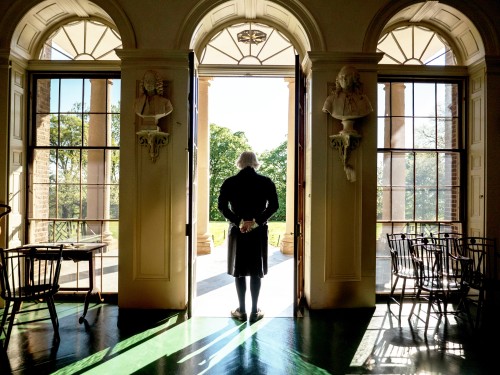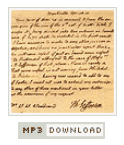![]()
By Michael Laris, Published: March 21, 2013.
© The Washington Post Company. Reproduced with the permission of the Washington Post.
Thomas Jefferson died 186 years ago. But J. Jefferson Looney still wants the nation’s third president to speak for himself.
The Monticello historian has spent more than a quarter-century deciphering, annotating and publishing thousands of Jefferson’s letters precisely as they were written, including eccentric spellings (“knolege”), obscure capitalizations and musings on slavery, God and death.
Looney’s work is part of an audacious, multimillion-dollar memorial to some of the nation’s most prominent Founding Fathers: an attempt to track down and publish an exhaustive collection of all of the significant correspondence and other documents written by — and sent to — George Washington, John Adams, Jefferson, James Madison, Alexander Hamilton and Benjamin Franklin.
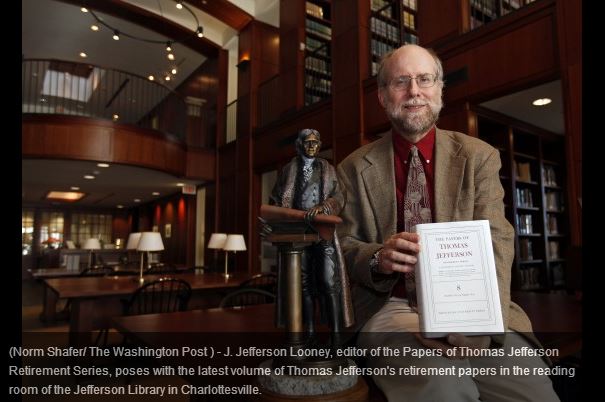
Since 1999, Looney has been indexing Jefferson’s letters on everything from censorship to cold foot baths using XML, a computer language good for categorizing things such as names and places, and flexible enough to evolve as the Internet does. Soon, a database made up of 197 volumes of Jefferson’s and the other Founders’ papers will be available to all online. Later, new volumes and rough, early copies of unpublished letters will be added.
Looney brings patience, a mathematician’s precision and a glint of mischief to his work, which he expects to complete by July 4 — in 2026.
He is 58, wears his beard somewhere between scraggly and scholarly, and has 375 neckties, which he organizes to avoid repeats. Among them: the Gettysburg Address in Lincoln’s handwriting and tiny tree toads.
From his office down the hill from Monticello, Looney wrestles with letters full of wit, hypocrisy and humanity. One day, the debt-ridden author of the Declaration of Independence is concerned about luring a great watchmaker to Charlottesville. On another, the obstinate slaveholder is terrified at the life-threatening illness of longtime slave Burwell Colbert, with whom he had grown close.
When Looney is done, he wants readers hundreds of years from now to have “pretty close to the ultimate tool kit” for understanding Jefferson.
“People create their own Jefferson out of the available record. . . . He’s slippery that way,” Looney said. “You can interpret him more than one way, and each generation has a way of finding the Jefferson it wants and needs in his papers.”
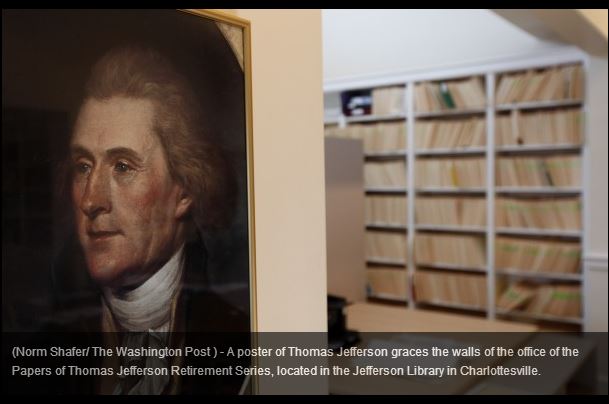
A definitive collection
Months after President Franklin D. Roosevelt dedicated the marble-and-granite Jefferson Memorial in 1943, a historian proposed a definitive, multimillion-word collection of Jefferson’s writings.
Julian Boyd, an expert on the Declaration of Independence, launched the project at Princeton, where he was a librarian.
He thought it would take 10 years, maybe 15.
His predictions were off, in part, because he insisted on including incoming letters, which paint a picture not just of Jefferson but his era. That became the standard for other Founders projects that followed.
Boyd died in 1980, still at work after 36 years.
Four years later, fresh after finishing his doctorate at Princeton, Looney started work in the basement offices of the Papers of Thomas Jefferson. He came in as the computer guy and rose up. He eventually left Princeton to head the Dictionary of Virginia Biography.
Then in 1999, the Jefferson Papers drew Looney back to what has become his life’s work. With a push and hefty donations from the Pew Charitable Trusts, which wanted to see the process sped up, Princeton agreed to shift responsibility for Jefferson’s post-White House papers to scholars at Monticello. Looney landed the top job there, and he has edited the Papers of Thomas Jefferson: Retirement Series since.
Although Looney’s project does not receive federal money and is funded by private donors, his work will be carried on the National Archives’ free, searchable Founders Online site — a $2 million effort scheduled to open this spring.
For years, the University of Virginia Press’s digital division had printed volumes digitized in India for a subscription service, paying 20-somethings in Chennai, India, to work nine-hour shifts typing them in twice to boost accuracy. The federal money accelerated the process and will open up the database to everyone.
“What I find exciting,” Looney said, “is most of my readers haven’t been born yet.”
‘Like his friends’
Sitting on the couch in the Looneys’ modest brick home in Charlottesville, Judy Looney says she’d lose it if she had to spend countless hours decoding even the tiniest Jeffersonian detail.
Not her husband.
“He lives in that period. These are like his friends. He knows all of these people,” she said. “He just gets interested in something, and when he does, he has to do it all.”
Their living room is scattered with newspapers and piles of DVDs. Bookshelves strain with row after row of early-20th-century adventure novels, stacked two deep, and yellowing history board games from Looney’s youth, including “Broadside,” about the War of 1812.
“It’s always like this, and we never seem to make any headway,” said Judy Looney, a former lab technician. “He has no interest in putting things away.”
It is a contrast to the meticulous system he helped design to track thousands of Jefferson documents at various stages of editing. Decades deciphering Jefferson’s brain have helped Looney learn about his own.
“I think I gravitate toward jobs that require a lot of organization and precision as a sort of corrective, because I’m not a real organized guy,” he said. “I sometimes think I force myself into areas where you have to do that or you can’t succeed.”
An uncommon touch
In an era of quick hits and dashed off e-mails, Looney’s 10-person editorial team goes through endless red pencils. They stare at tandem screens and smudgy photocopies, and they read to one another from handwritten originals to catch mistakes. They write biographical sketches. Indexing takes months each year. Unlike a search engine, they know that when Jefferson says “my people,” the reference will likely go under “S” for slavery.
|
|
“We go a healthy amount of crazy,” said Ellen Hickman, one of Looney’s assistant editors.Those who have spent decades on mammoth documentary projects say Looney has an uncommon touch.
“Many people do this work extremely well. But to do it at the very highest level takes a kind of gift,” said Ellen R. Cohn, editor of “The Papers of Benjamin Franklin.” It “takes extraordinary creativity, in that you’ve got to recognize clues in distant jottings and scraps of paper that can be the building blocks of a big story.”
Jefferson was a loquacious correspondent on matters scientific, architectural, political and more. He used a primitive copy machine and kept a detailed log of letters. The era’s climbers often wrote him, testing ideas and seeking wisdom — and job recommendations, which didn’t always turn out.
Jefferson sent a recommendation to President James Madison on behalf of a neighbor who wanted a post in Lisbon. Jefferson also enclosed another letter at the same time, noting that the neighbor “is not qualified by education or understanding for the duties of the office.”
He didn’t get the job.
‘Ability to go into details’
Mail meant for J. Jefferson Looney at Monticello is often addressed to T. Jefferson Looney. But he was named for his great-grandfather in Missouri, not the father of American democracy.
Looney’s father, Chesley, helped design a worldwide satellite tracking system for NASA. His mother, Ida Ruth, was an English major and homemaker who hooked the kids on books and has been Looney’s Scrabble partner for decades. One brother worked on software to repair the Hubble telescope, another with air traffic control systems.
“All of them have an ability to go into details,” Chesley Looney said.
J. Jefferson Looney would ride his bike from his boyhood home in Hyattsville to the University of Maryland, where he majored in history and math. Today, he often sounds like a Dashiell Hammett character, saying one of his main jobs is to “try to smell a rat.”
He smelled one in a letter sent to Jefferson on April 23, 1812.
At first it just looked like a bunch of numbers.
153.49.42.920
72.51.36.375
68.53.15.150
But Looney saw a story.
Jefferson’s correspondent was calculating the longitude of the U.S. Capitol, trying to build a case that the young nation should reset its maps with Washington — not Greenwich, England — as the center of the world. The United States had its own currency, so why shouldn’t it have its own prime meridian, from which every place else should be measured?
“It’s part of a very broad movement to create sort of an American identity,” Looney said.
But Looney sensed something was amiss. On a last-minute read before sending the final pages to the printer, he caught the error: An earlier archivist had mislabeled the page numbers, scrambling the writer’s calculations.
“What’s exciting and interesting and fun about it is that every day you get to work on a new series of detective stories,” Looney said. “It isn’t just this altruistic thing — that I want to help other people. I find it fascinating.”
And entertaining.
In one “senior moment,” Looney recalls, Jefferson accidentally sent a friend a letter meant for James Madison. Looney cracked up reading Jefferson’s apology for the “blunder.”
“I committed a similar one while in Paris,” Jefferson told his friend, “by cross directing two letters to two ladies out of which scrape I did not get so easily.”
Using his best aggrieved voice, Looney said: “ ‘I thought he liked me better!’ ”
They haven’t been able to find the letters, “which is sad, but in some ways it’s better,” Looney said. “You could just write a whole book about that.”
Letting Jefferson speak
Looney says he tries to avoid writing long annotations filled with current scholarship or opinions, which would make for dated reading centuries from now or being drawn into contemporary fistfights over Jefferson’s legacy.
Ask him about what Jefferson’s slave-owning says about his character, and Looney responds, as he often does, by citing a letter: this one sent July 31, 1814, by Edward Coles, a fellow Virginian and secretary to Madison.
Coles asked Jefferson to step forward with a plan to end the evil of slavery in Virginia. He cited Jefferson’s stature as one of the “revered Fathers of all our political and social blessings” and his role “establishing on the broadest basis the rights of man.”
Jefferson responded Aug. 25, saying he had hoped young people would have “sympathised with oppression wherever found,” but instead there had been apathy. Emancipation would come, Jefferson continued, just led by the young, not him. When it did, he favored a gradual freeing “of those born after a given day” to lessen the shock. (Jefferson’s response included his typical colorful spelling, capitalization and punctuation.)
“for, men, probably of any colour, but of this color we know, brought up from their infancy without necessity for thought or forecast, are by their habits rendered as incapable as children of taking care of themselves . . . they are pests in society by their idleness, and the depredations to which this leads them. their amalgamation with the other colour produces a degradation to which no lover of his country, no lover of excellence in the human character can innocently consent.”
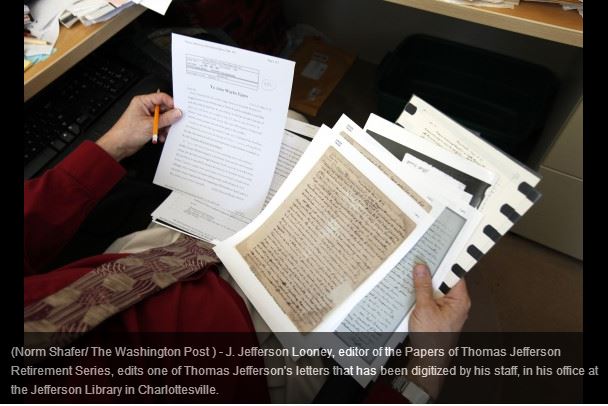
Coles wrote back on Sept. 26, calling again for Jefferson to take the lead. He got no answer.
“It would have had enormous symbolic value if Jefferson had done something like that. But he didn’t. We can’t get around that,” Looney said. “His late unwillingness to risk any political capital on the subject speaks volumes.”
And that’s where he leaves it.
“I want to print the documents and let other people do what they do with them,” he said.
Jefferson wrote his last two known letters on June 25, 1826, and died days later, on July 4. Looney is up to 1818.
“The big payoff,” he said, “is hoping to last long enough to get to all of those documents that are coming up.”
